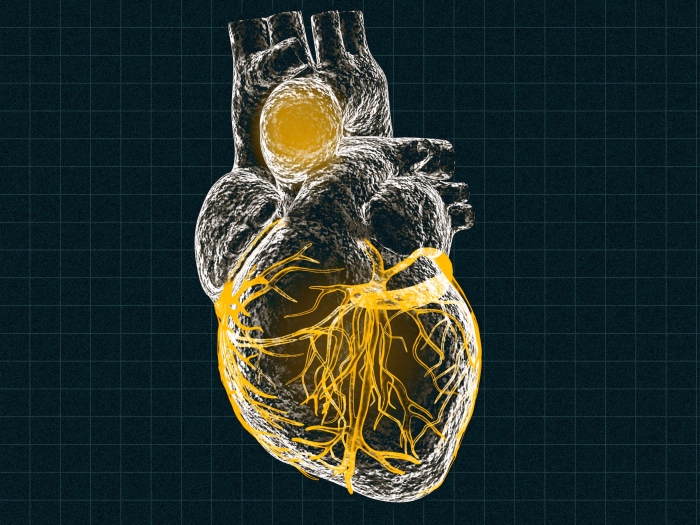It showed high levels of accuracy at predicting death, major bleeding events and the need for blood transfusion
5:00 AM
Author |

Listen to this article on Health Lab's podcast.
When a person has one or more blocked arteries, providers may choose to conduct a minimally invasive procedure known as percutaneous coronary intervention, or PCI.
By inflating a balloon and potentially placing a stent, blood can flow more freely from the heart.
Despite carrying less risk than open surgery, stenting and balloon angioplasty can result in complications like bleeding and kidney injury.
Researchers at Michigan Medicine developed an AI-driven algorithm that accurately predicts death and complications after PCI — which could emerge as a tool for clinicians as they determine treatment for blocked heart arteries.
The results are published in European Heart Journal.
“The risks for patients undergoing percutaneous coronary intervention vary greatly depending on the individual patient, and both patients and clinicians have historically both over and underestimated the harms associated with PCI,” said lead David E. Hamilton, M.D., a cardiology-critical care fellow at Michigan Medicine.
“Precise risk prediction is critical to treatment selection and the shared decision-making process. Our tool can recognize a wide array of outcomes after PCI and can be used by care providers and patients together to decide the best course of treatment.”
While other risk stratification tools have been created to identify risk after PCI, researcher say, many have modest accuracy and were made without involving a key party: patients.
The Michigan Medicine team collected data from all adult patients who underwent PCI between April 2018 and the end of 2021 using the Blue Cross Blue Shield of Michigan Cardiovascular Consortium, or BMC2, registry.
The consortium is comprised of hospitals across the state of Michigan that use data they collect to inform quality projects, and improve care and patient outcomes.
Researchers used that data — including more than 20 pre-procedural characteristics, such as age, blood pressure and total cholesterol — to create a risk prediction model with the machine learning software “XGBoost”.
The AI-driven model showed high levels of accuracy at predicting death, major bleeding events and the need for blood transfusion. It outperformed other models that used the same pre-procedural characteristics.
“We combined the predictive model with patient feedback from the PCI Patient Advisory Council to transform machine learning into this patient-centered, individualized risk prediction tool,” said senior author Hitinder Gurm, MBBS, interim chief medical officer at U-M Health.
“In the age of widespread smartphones and electronic medical records, this computerized risk score could be integrated into electronic health systems and made easy to use at the bedside. It would not only help relay complex information to the provider quickly, but it could also be used to enhance patient education on the risks related to PCI.”
The innovative technology has been harnessed into a computer and phone application to allow for free and widespread use.
Jeremy Albright Ph.D., Milan Seth, Devraj Sukul M.Sc., M.D., all of Michigan Medicine, Ian Painter Ph.D., of Washington State Department of Health and Foundations for Health Care Quality, Charles Maynard Ph.D., of Foundations for Health Care Quality and University of Washington, and Ravi S. Hira M.D., of University of Washington and Pulse Heart Institute and Multicare Health System.
Support for BMC2 is provided by Blue Cross and Blue Shield of Michigan and Blue Care Network as part of the BCBSM Value Partnerships program. Although Blue Cross Blue Shield of Michigan and BMC2 work collaboratively, the opinions, beliefs and viewpoints expressed by the author do not necessarily reflect the opinions, beliefs, and viewpoints of BCBSM or any of its employees.
Paper cited: “Merging Machine Learning and Patient Preference: Patient-Centered Tool for Predicting Risk of Percutaneous Coronary Intervention,” European Heart Journal. DOI: 10.1093/eurheartj/ehad836
Sign up for Health Lab newsletters today. Get medical tips from top experts and learn about new scientific discoveries every week by subscribing to Health Lab’s two newsletters, Health & Wellness and Research & Innovation.
Sign up for the Health Lab Podcast: Add us on Spotify, Apple Podcasts or wherever you get you listen to your favorite shows.

Explore a variety of healthcare news & stories by visiting the Health Lab home page for more articles.

Department of Communication at Michigan Medicine

Want top health & research news weekly? Sign up for Health Lab’s newsletters today!





